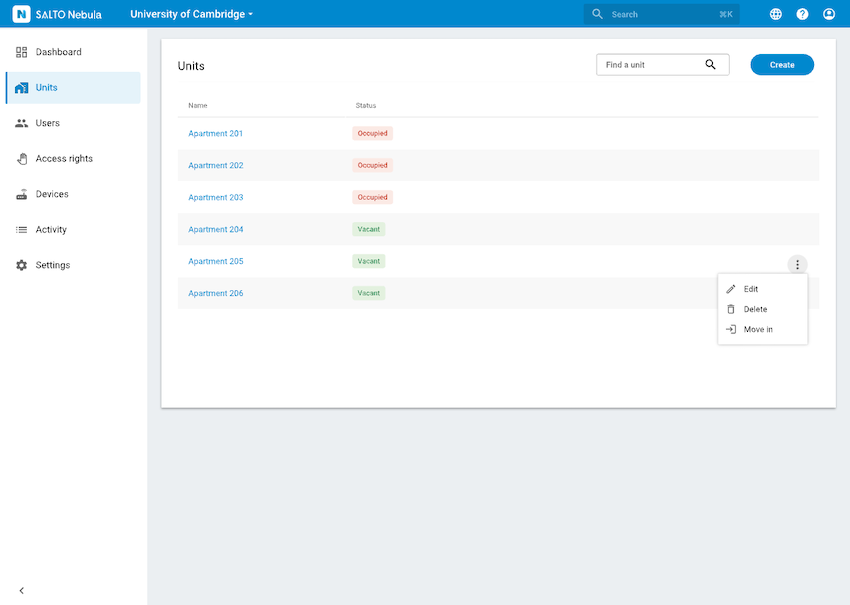Introduction to units in Nebula Beta
Overview
A unit is a sub-grouping within an installation. A common use case for a unit might be an individual apartment which is located within an apartment block. A unit can also often be considered a "rentable space". For example, it could be an office space located within a larger office building that contains multiple office spaces rented by different companies. Other use cases include hotel rooms (units) inside a hotel (installation).
Units allow for easy management of users who need to unlock the access points that belong to their own unit as well as facilitating the delegation of visitor management.
Unit management profiles
There are two user profiles for unit management:
System manager: a user who manages an installation or multiple installations, with permissions to create and manage units within those installations. System managers can create unit managers. An example of a system manager could be a property manager who administers an apartment building.
Unit manager: a user who manages a unit and has no permission to manage at the installation level. This user does not see any of Nebula's access control elements at the installation level. Instead, they manage their own unit, mainly by allowing other users access. There are two types of unit managers:
- Unit managers who can create other unit managers.
- Unit managers who cannot create other unit managers.
Unit managers generally create and manage regular users who are keyholders with no management permissions. However, if you mark the checkbox "Can also create other unit managers" when creating a unit user, the unit manager will not only be able to create keyholders within the unit, but also other unit managers.
Although you must have a system manager role to be able to create a unit, units can also be created by owners. For the purposes of this guide, the system manager is generally indicated as the role with the highest level of permissions to manage a unit.
See the section on unit management for more information.
Key unit concepts
These are some of the main points to consider when creating units:
- A Nebula system manager or owner can manage both installations and units.
- Use cases for a unit manager who only manages an individual unit could be a tenant in an apartment or a coworking office manager, for example.
- Units mainly consist of users who are only keyholders. These are users to whom the unit manager may only want to give limited access. For example, cleaning staff or maintenance workers like plumbers or electricians. They could also be other members of the household or office who don't have any permissions to manage the unit.
- Unit users must be added to the unit initially using the 'Move in' functionality. Once a unit has been moved in and its status becomes Occupied, you can then create or delete users within that unit. However, when it comes to deleting users, the last remaining user of a unit cannot be deleted until that unit is moved out. Once moved out, the unit's status changes from Occupied to Vacant.
 Units are either labelled as 'Vacant' or 'Occupied', depending on their current status
Units are either labelled as 'Vacant' or 'Occupied', depending on their current status
- Access points can be either common to the installation or specific to the unit.
When creating units it's useful to consider that there are two types of access points that can belong to the access plan of the unit:
- Access points that are specific to the unit. For example, the front door of an apartment.
- Communal access points within the installation. Examples of these could be the main building front door, a gym, or other types of access to facilities and amenities within the larger installation.
- Unit managers can use unit access rights as they were defined by the system manager, or limit them to be more restrictive. The access rights which a system manager creates for a unit can include access points that belong to both the installation and the unit. Unit managers cannot configure access that is more permissive than that which has already been created by the system manager.
- Activity can differ between the unit manager and the system manager. A unit manager will only see events, such as the unlocking of access points, that are related to users and elements of their specific unit. However, it's worth bearing in mind that in the case of access points, these events can also be communal if the access point has been created at the installation level.
- Units can have multiple unit managers or users with no management roles at all. There may be use cases where there are no users with management roles in the unit. In this scenario, all the unit users would be keyholders only. This means that to make any changes, like providing access to other users or adjusting their access rights, these users would have to ask their property manager (system manager) to make those changes for them. This might involve going to the front desk of an apartment building or hotel to ask for those changes to be made.
- There are two levels of unit managers. Those who have permission to create other unit managers and those who can only create unit keyholders. See also the section on creating unit users.
